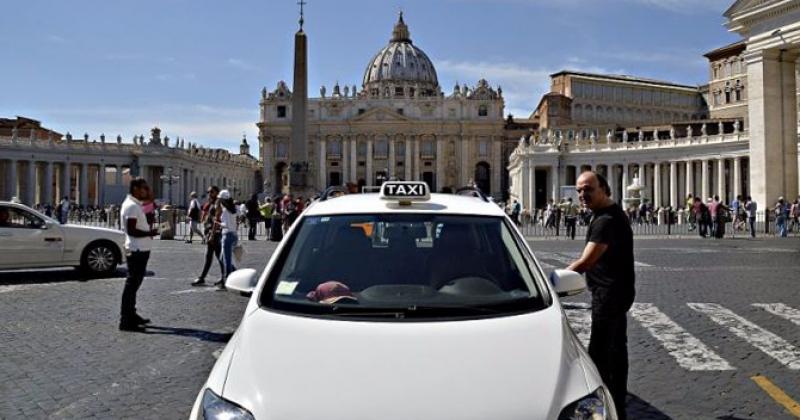This was the subject of the story the Pope told at today’s General Audience dedicated to migration. Selfishness, barriers and walls encourage trafficking criminals. We are all called to welcome brothers and sisters fleeing war, famine, violence and inhumane living conditions, Francis said
An Armenian woman, a “smelly” refugee and a Roman taxi driver whose initial reluctance to let the refugee in subsided when he listened to the foreign man’s story, which “perfumed” and changed his soul. Pope Francis dedicated today’s General Audience in St. Peter’s Square to the issue of immigration, taking his cue from Jesus’ words regarding foreigners (“I was a stranger and you welcomed me, I was naked and you clothed me"): a “closed attitude” – walls, barriers, instinctive selfishness – “ends up benefiting trafficking criminals,” he said, “we are all called to welcome the brothers and sisters fleeing war, famine, violence and inhumane living conditions”. Then, to illustrate his point at a time when there is a big controversy in Europe over the immigration issue, Francis told a “little story” off the cuff, almost like a parable, which does not condemn people’s suspicion towards foreigners but shows how the heart can change.
“A few days ago something happened, a little story,” the Pope said. “There was a refugee who was looking for a street and a lady approached the asking what he wanted. He was barefoot and said he wanted to go to St. Peter’s to enter the Holy Door. The lady then called a taxi because he had no shoes. But the refugee smelled and the taxi driver did not want to take him. Eventually, he let both the refugee and the lady in, and she asked him to tell her his story along the way. The man recounted his painful story and explained why he had fled from home. Once they arrived the lady opened her purse to pay the taxi driver, who at first had not wanted to pick up the migrant because he smelled. The taxi driver refused to take the money: ‘It is I who should pay you,’ he said, ‘because thanks to you I have listened to a story that has changed my heart’. This lady, of Armenian blood,” the Pope said, “knew what it meant to be part of a people who are forced to flee. Think about this story and think about what we can do for refugees". “When we do something like that initially there is some discomfort – ‘a smell’ – but in the end, a story like this perfumes our soul, and changes us. Think about this story and think what you can do for refugees,” the Pope ended by saying.
At today’s Audience, the Pope continued his series of catecheses on the corporal works of mercy, within the context of the Jubilee which draws to a close on 20 November. The Pope focused in particular on what Jesus says according to Matthew’s Gospel: “I was a stranger and you welcomed me, I was naked and you clothed me": “In our times,” the Pope said, “ever the work that relates to the foreigners is more timely than ever. The economic crisis, armed conflict and climate change drive many people to emigrate. However, migration is not a new phenomenon, but belong to the history of humanity.”
“The belief that they are pertinent to our times alone reveals a lack of historical memory,” the Pope said, recalling “the many concrete examples of migration. Just think of Abraham, "the people of Israel and of the same Holy Family”. “The history of mankind is the history of migrations in all latitudes, there is no people that has not experienced the phenomenon of migration. Over the centuries we have witnessed major expressions of solidarity in this regard, although there have also been social tensions. Today, the context of economic crisis unfortunately favours the emergence of attitudes of closure and not welcome. In some parts of the world walls and barriers arise. It seems sometimes that the silent work of many men and women who, in various ways, are doing their utmost to help and assist refugees and migrants is obscured by the noise of others voicing an instinctive egoism. But a closed attitude,” the Pope remarked, “is not a solution, in fact, it ultimately benefits the criminals involved in trafficking. The only solution is that of solidarity, solidarity with the migrant, solidarity with the foreigner."
Today too, the Pope said, making a special reference to St. Frances Cabrini and the support she gave migrants headed for the United States of America, “the dioceses, parishes, institutes of consecrated life, associations and movements, as well as individual Christians,” “we are all called to welcome the brothers and sisters fleeing war, famine, violence and inhumane living conditions. All together we are a great strength of support for those who have lost home, family, work and dignity."
The evangelical principle of “clothing the naked” is particularly pertinent to “female victims of trafficking who are thrown out onto the streets, or “the others many ways of using the human body as if it were a commodity, even minors. Think, too, of those who do not have a job, a house, a fair wage, this is a form of 'nakedness', or being discriminated against on the grounds of race or religion, they are all forms of 'nakedness', before which as Christians we are called to be attentive, vigilant and ready to act."
"Dear brothers and sisters, we must not fall into the trap where we shut ourselves in ourselves, indifferent to the needs of our brothers and sisters and worried only about our own interests. It is precisely to the extent that we open ourselves to others that life becomes fruitful, that society regains peace and people regain their full dignity. And do not forget,” Francis ended by saying, “that lady, the migrant who smelled and do not forget that driver whose soul was changed by the migrant".
